Stage Manager Resume Examples

Jul 18, 2024
|
12 min read
Get hired and call the shots: practical tips for your stage manager resume. Learn how to highlight your experience, skills, and achievements for a starring role in a well-orchestrated production.
Rated by 348 people
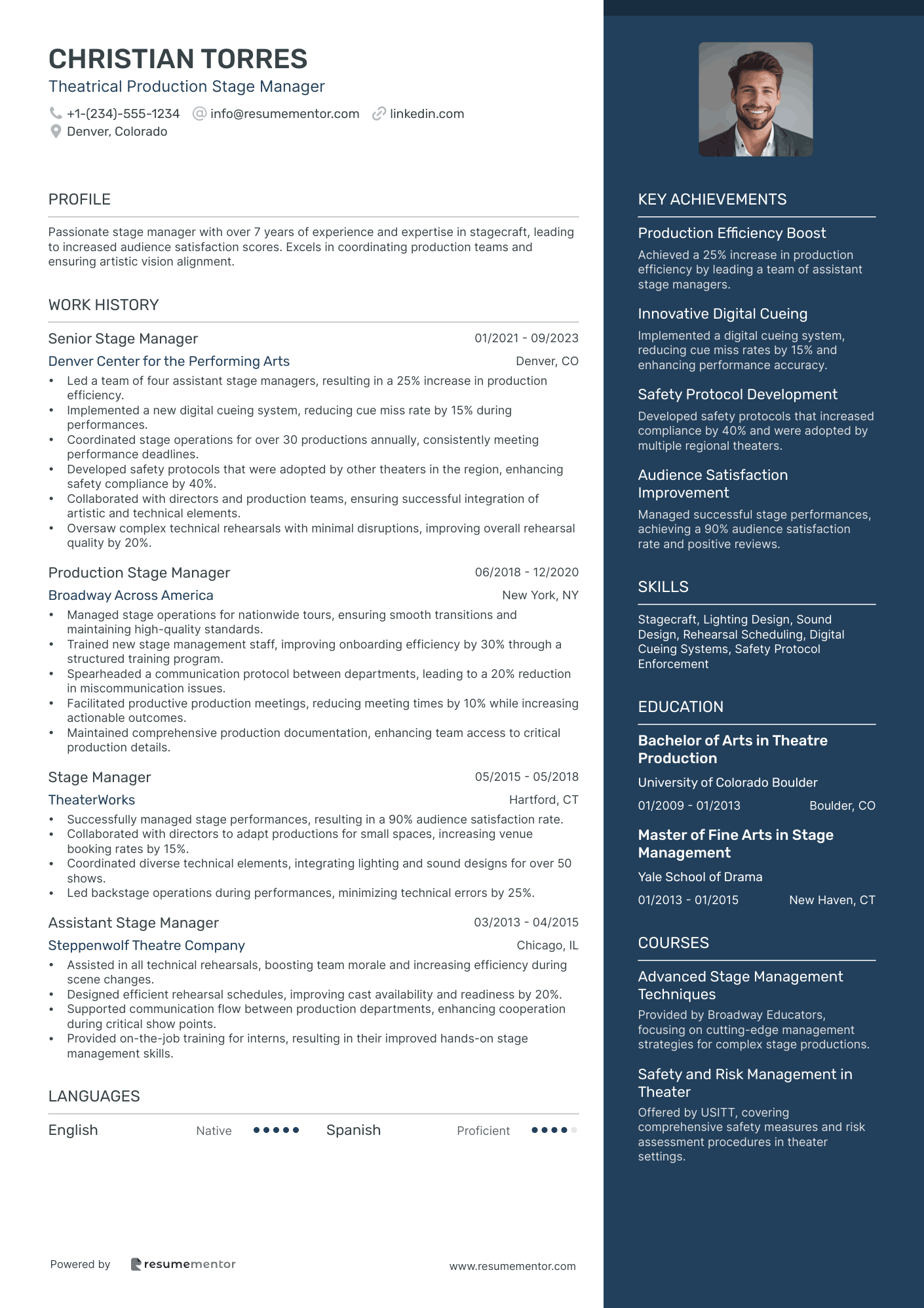
Theatrical Production Stage Manager
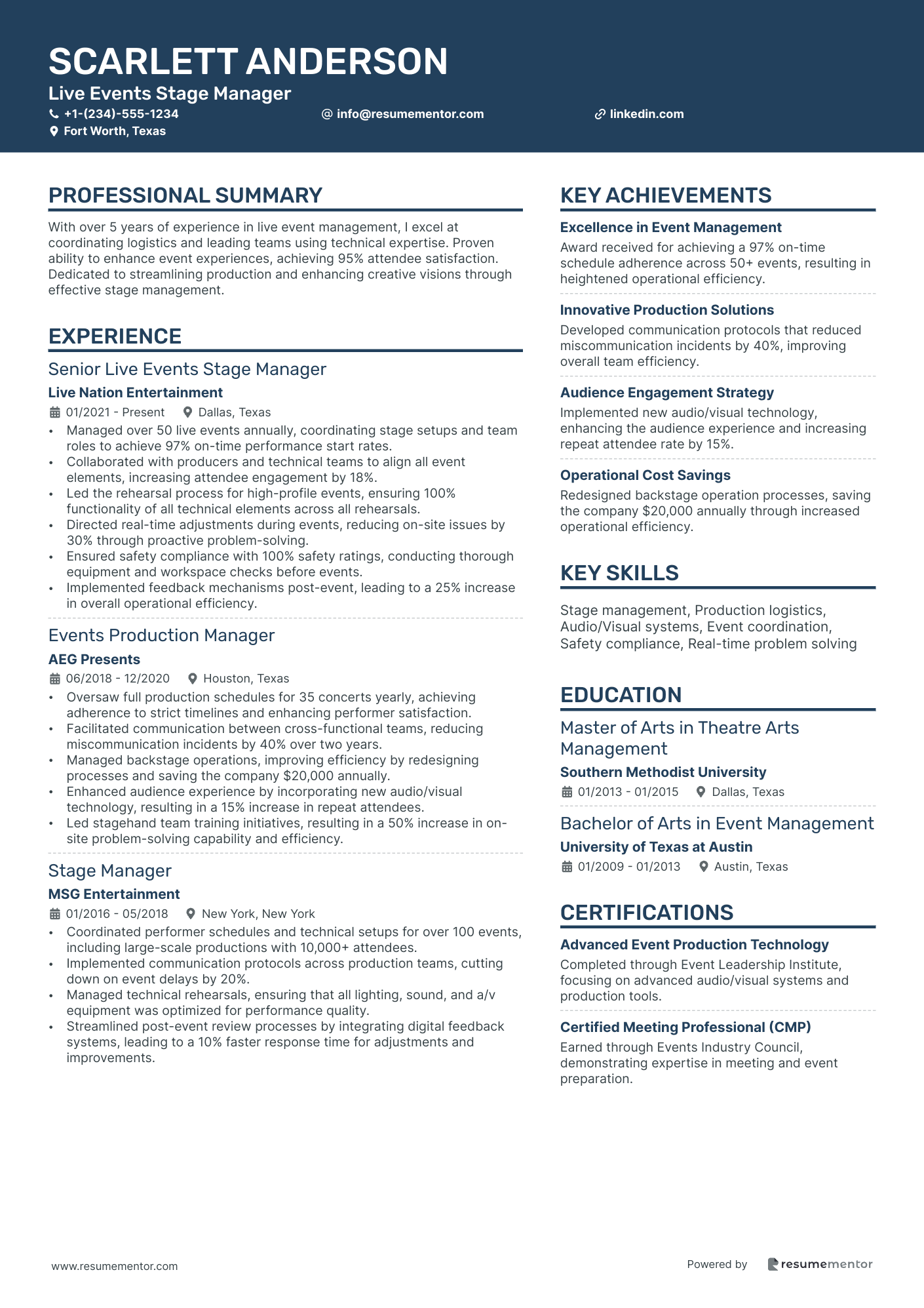
Live Events Stage Manager
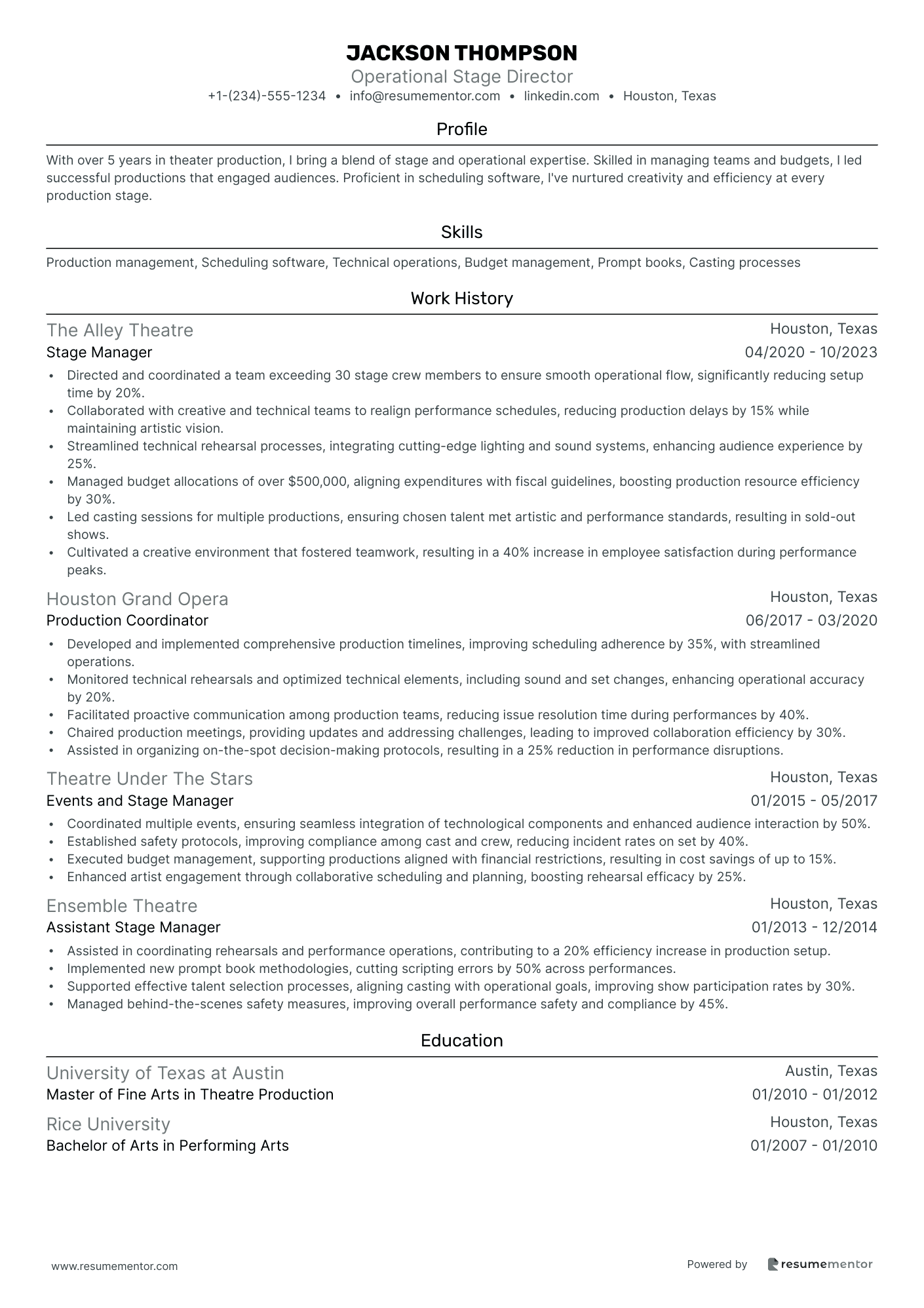
Operational Stage Director
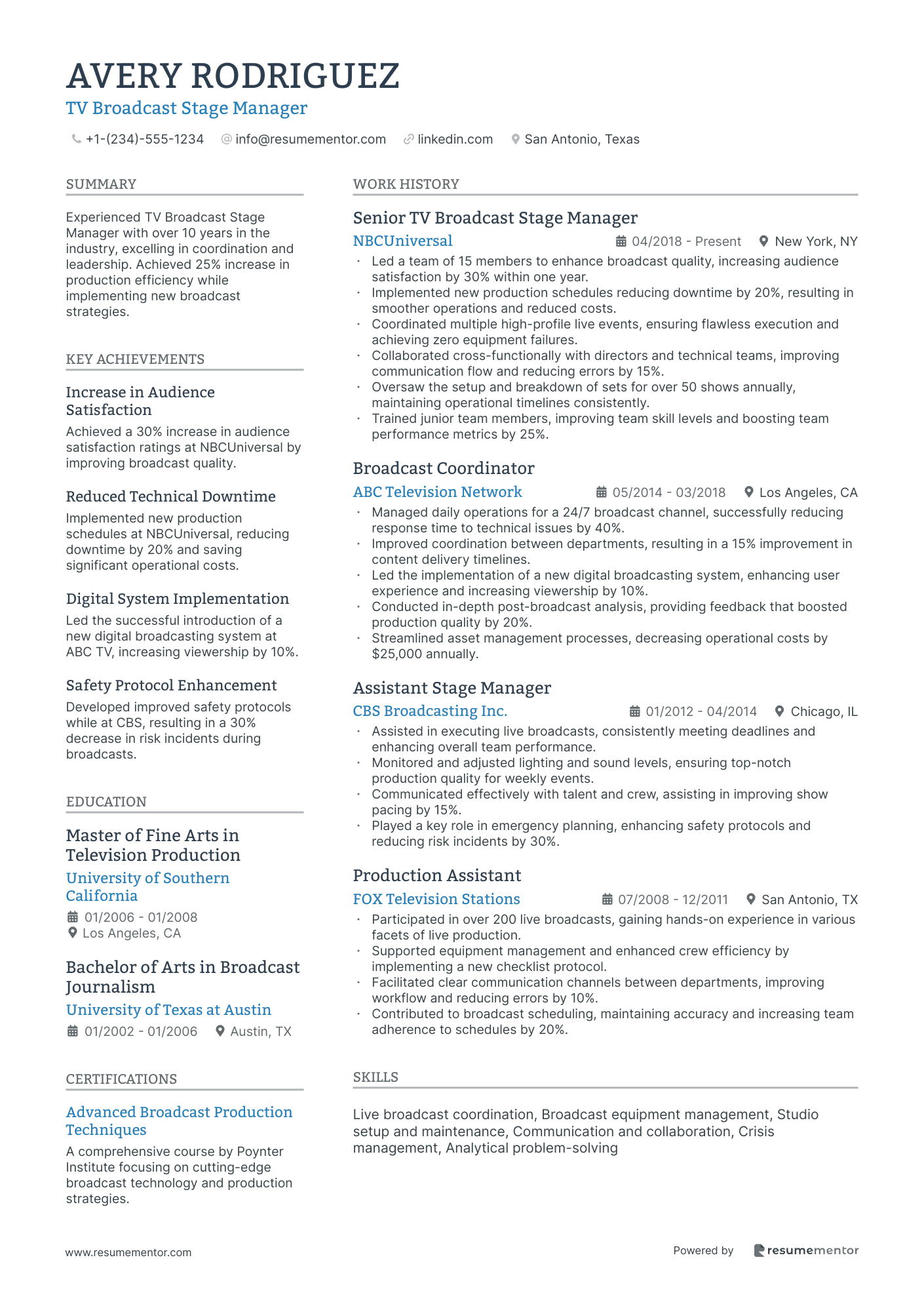
TV Broadcast Stage Manager
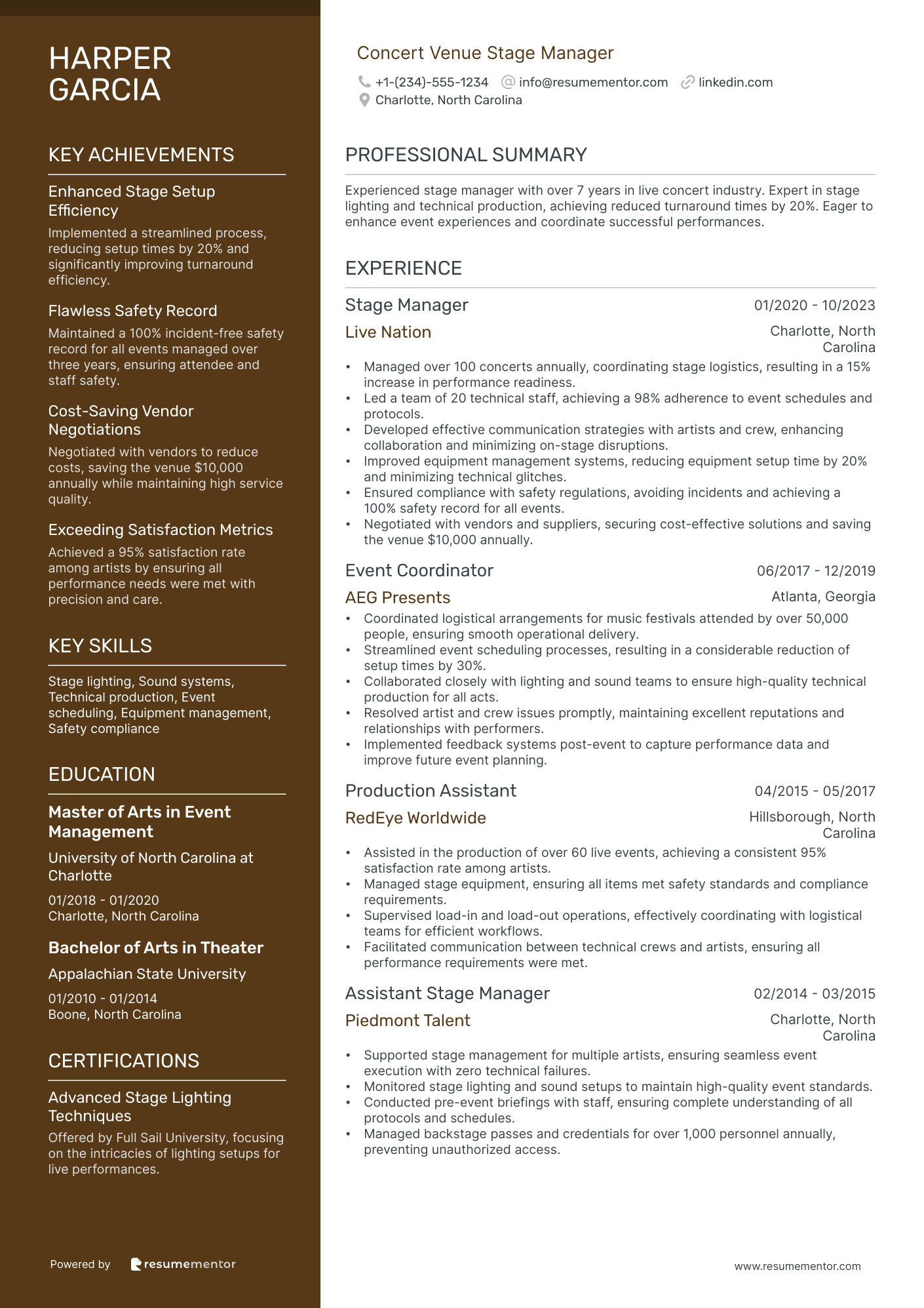
Concert Venue Stage Manager
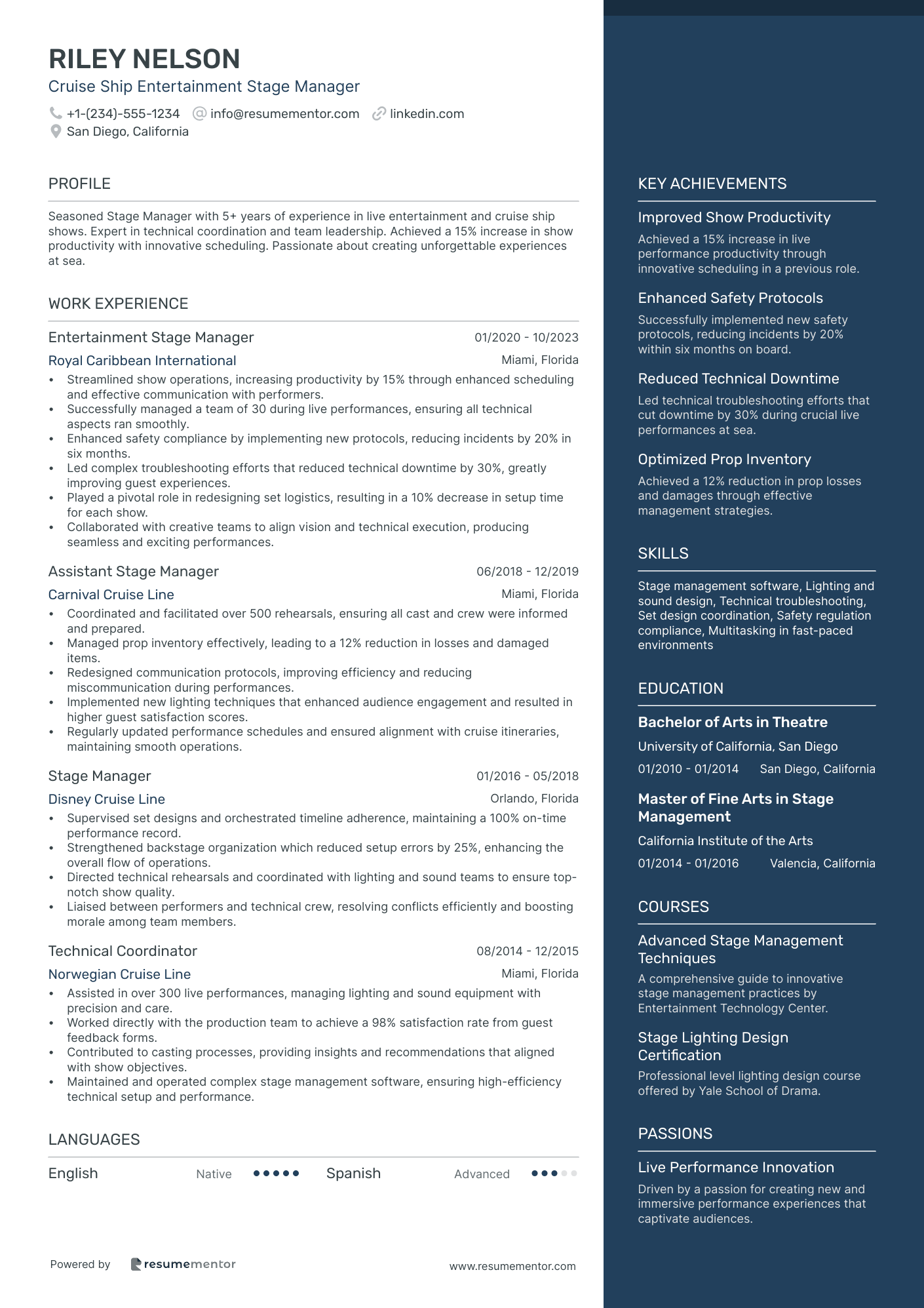
Cruise Ship Entertainment Stage Manager
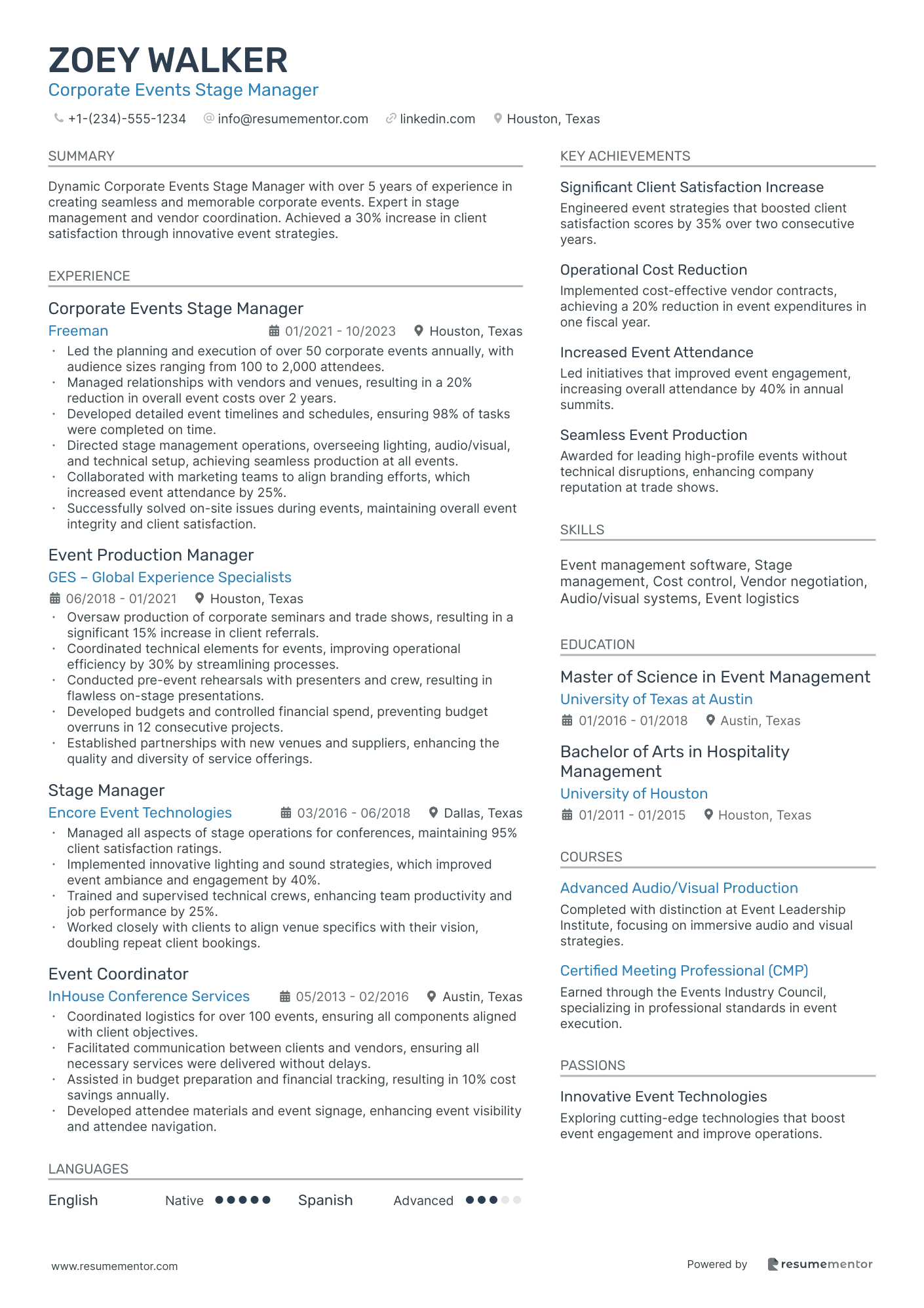
Corporate Events Stage Manager
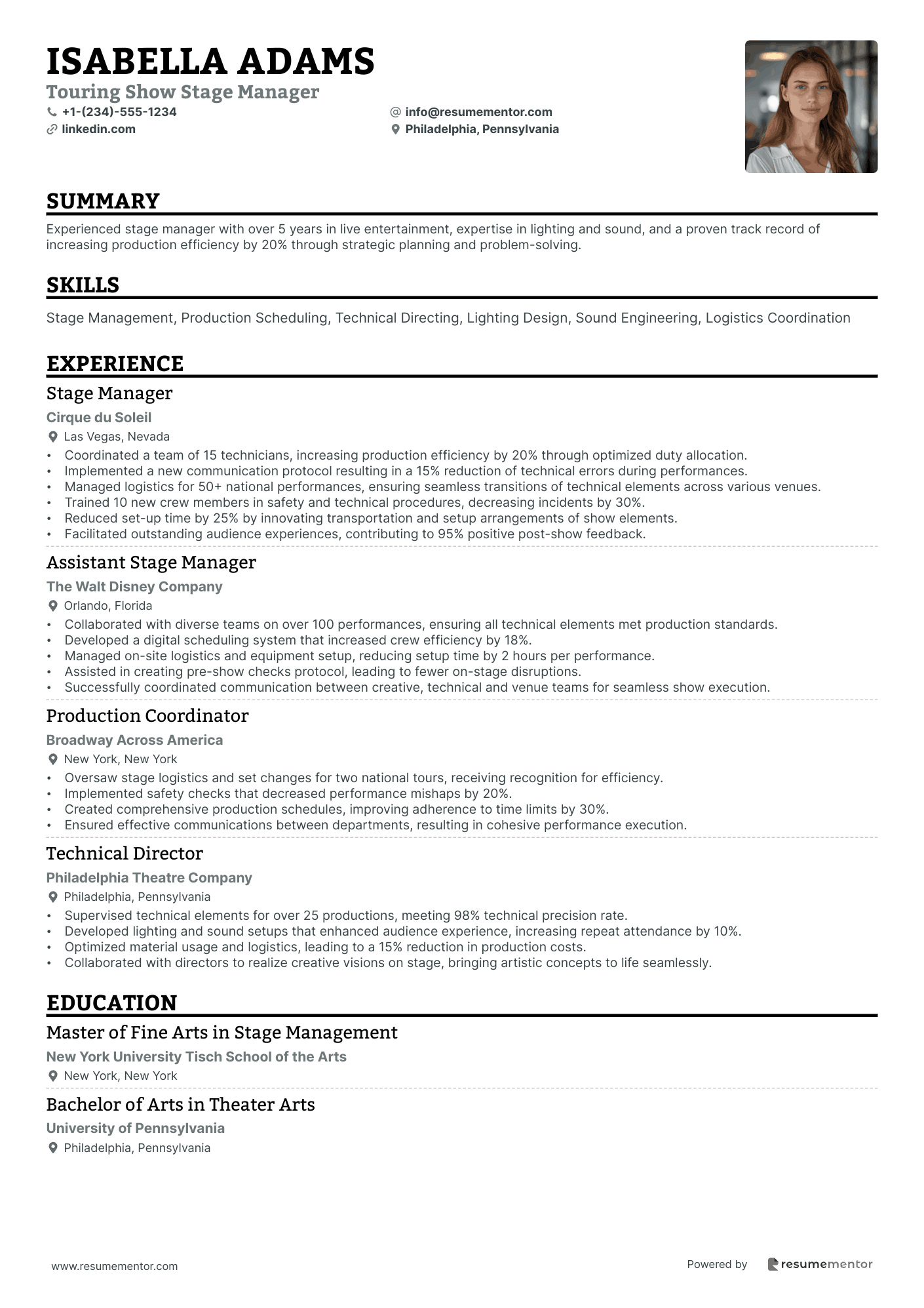
Touring Show Stage Manager
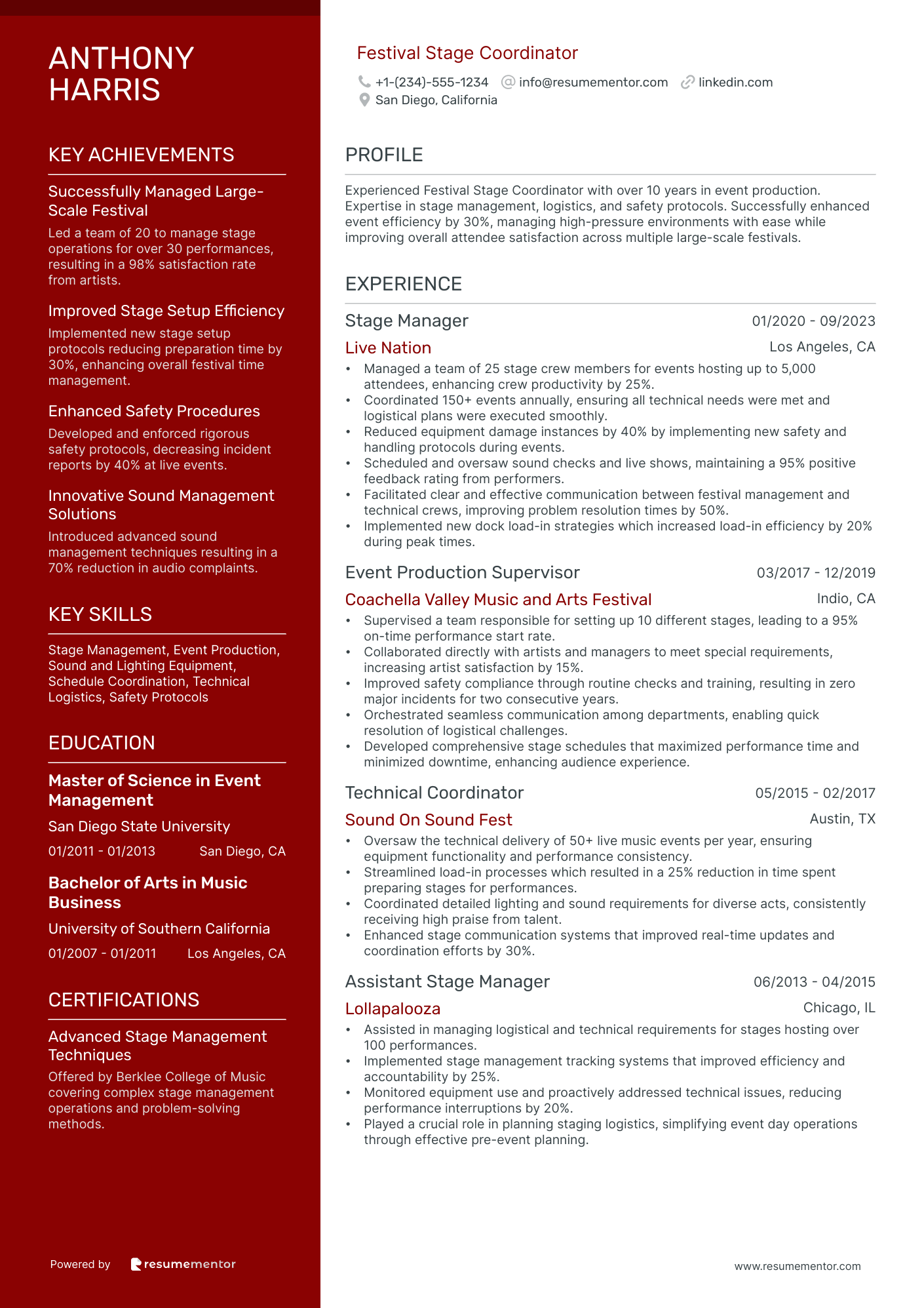
Festival Stage Coordinator
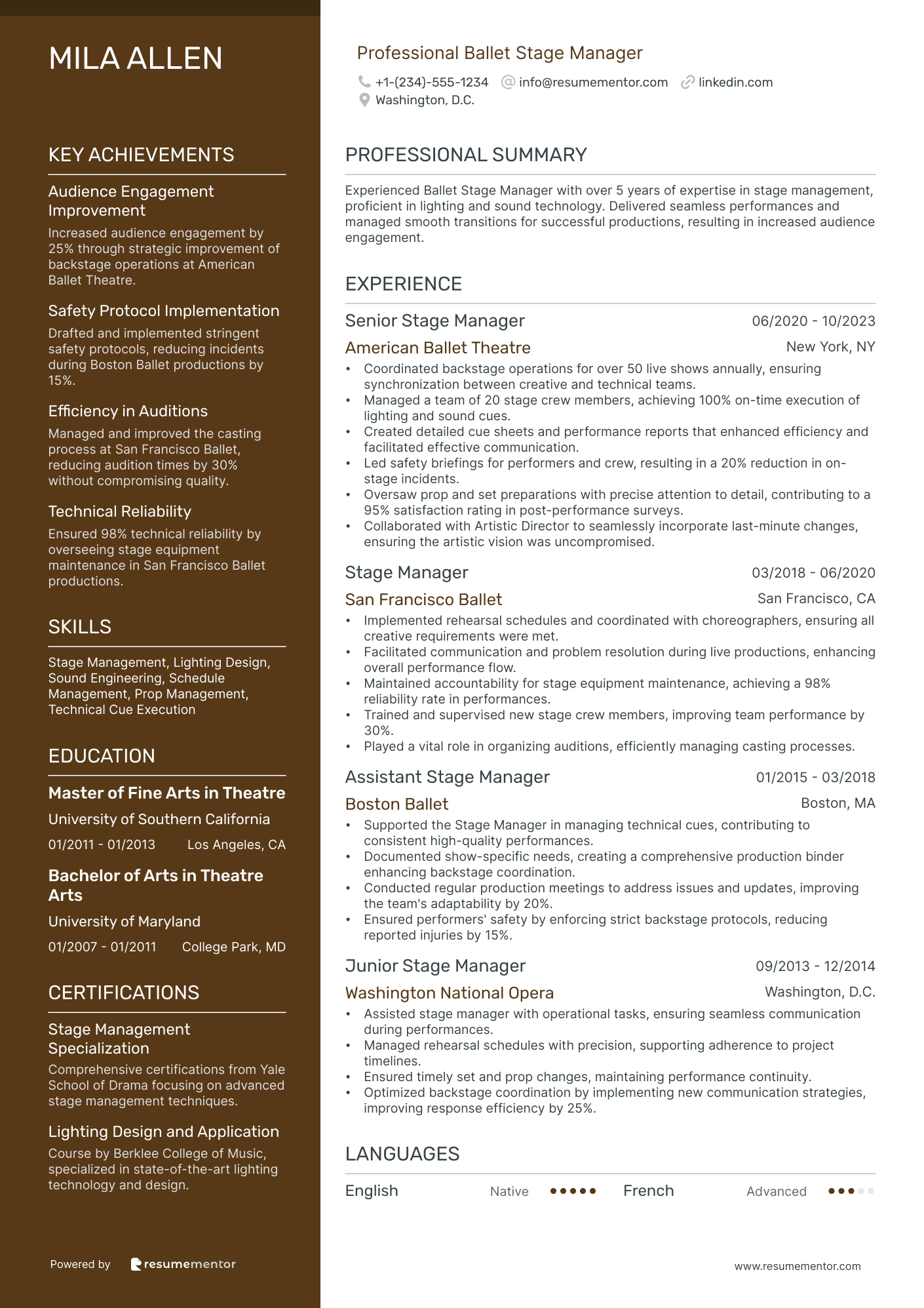
Professional Ballet Stage Manager

Theatrical Production Stage Manager resume sample
- •Led a team of four assistant stage managers, resulting in a 25% increase in production efficiency.
- •Implemented a new digital cueing system, reducing cue miss rate by 15% during performances.
- •Coordinated stage operations for over 30 productions annually, consistently meeting performance deadlines.
- •Developed safety protocols that were adopted by other theaters in the region, enhancing safety compliance by 40%.
- •Collaborated with directors and production teams, ensuring successful integration of artistic and technical elements.
- •Oversaw complex technical rehearsals with minimal disruptions, improving overall rehearsal quality by 20%.
- •Managed stage operations for nationwide tours, ensuring smooth transitions and maintaining high-quality standards.
- •Trained new stage management staff, improving onboarding efficiency by 30% through a structured training program.
- •Spearheaded a communication protocol between departments, leading to a 20% reduction in miscommunication issues.
- •Facilitated productive production meetings, reducing meeting times by 10% while increasing actionable outcomes.
- •Maintained comprehensive production documentation, enhancing team access to critical production details.
- •Successfully managed stage performances, resulting in a 90% audience satisfaction rate.
- •Collaborated with directors to adapt productions for small spaces, increasing venue booking rates by 15%.
- •Coordinated diverse technical elements, integrating lighting and sound designs for over 50 shows.
- •Led backstage operations during performances, minimizing technical errors by 25%.
- •Assisted in all technical rehearsals, boosting team morale and increasing efficiency during scene changes.
- •Designed efficient rehearsal schedules, improving cast availability and readiness by 20%.
- •Supported communication flow between production departments, enhancing cooperation during critical show points.
- •Provided on-the-job training for interns, resulting in their improved hands-on stage management skills.
Live Events Stage Manager resume sample
- •Managed over 50 live events annually, coordinating stage setups and team roles to achieve 97% on-time performance start rates.
- •Collaborated with producers and technical teams to align all event elements, increasing attendee engagement by 18%.
- •Led the rehearsal process for high-profile events, ensuring 100% functionality of all technical elements across all rehearsals.
- •Directed real-time adjustments during events, reducing on-site issues by 30% through proactive problem-solving.
- •Ensured safety compliance with 100% safety ratings, conducting thorough equipment and workspace checks before events.
- •Implemented feedback mechanisms post-event, leading to a 25% increase in overall operational efficiency.
- •Oversaw full production schedules for 35 concerts yearly, achieving adherence to strict timelines and enhancing performer satisfaction.
- •Facilitated communication between cross-functional teams, reducing miscommunication incidents by 40% over two years.
- •Managed backstage operations, improving efficiency by redesigning processes and saving the company $20,000 annually.
- •Enhanced audience experience by incorporating new audio/visual technology, resulting in a 15% increase in repeat attendees.
- •Led stagehand team training initiatives, resulting in a 50% increase in on-site problem-solving capability and efficiency.
- •Coordinated performer schedules and technical setups for over 100 events, including large-scale productions with 10,000+ attendees.
- •Implemented communication protocols across production teams, cutting down on event delays by 20%.
- •Managed technical rehearsals, ensuring that all lighting, sound, and a/v equipment was optimized for performance quality.
- •Streamlined post-event review processes by integrating digital feedback systems, leading to a 10% faster response time for adjustments and improvements.
- •Assisted in managing stage setups and technical operations for theatrical productions, contributing to a 99% show completion rate.
- •Supported communication between directors and backstage teams, enhancing show quality and reducing disruptions by 15%.
- •Conducted equipment checks and collaborated with technical crews, ensuring 100% operational readiness for all performances.
- •Contributed to evaluation and feedback processes post-production, offering suggestions that improved subsequent performances by 10%.
Operational Stage Director resume sample
- •Directed and coordinated a team exceeding 30 stage crew members to ensure smooth operational flow, significantly reducing setup time by 20%.
- •Collaborated with creative and technical teams to realign performance schedules, reducing production delays by 15% while maintaining artistic vision.
- •Streamlined technical rehearsal processes, integrating cutting-edge lighting and sound systems, enhancing audience experience by 25%.
- •Managed budget allocations of over $500,000, aligning expenditures with fiscal guidelines, boosting production resource efficiency by 30%.
- •Led casting sessions for multiple productions, ensuring chosen talent met artistic and performance standards, resulting in sold-out shows.
- •Cultivated a creative environment that fostered teamwork, resulting in a 40% increase in employee satisfaction during performance peaks.
- •Developed and implemented comprehensive production timelines, improving scheduling adherence by 35%, with streamlined operations.
- •Monitored technical rehearsals and optimized technical elements, including sound and set changes, enhancing operational accuracy by 20%.
- •Facilitated proactive communication among production teams, reducing issue resolution time during performances by 40%.
- •Chaired production meetings, providing updates and addressing challenges, leading to improved collaboration efficiency by 30%.
- •Assisted in organizing on-the-spot decision-making protocols, resulting in a 25% reduction in performance disruptions.
- •Coordinated multiple events, ensuring seamless integration of technological components and enhanced audience interaction by 50%.
- •Established safety protocols, improving compliance among cast and crew, reducing incident rates on set by 40%.
- •Executed budget management, supporting productions aligned with financial restrictions, resulting in cost savings of up to 15%.
- •Enhanced artist engagement through collaborative scheduling and planning, boosting rehearsal efficacy by 25%.
- •Assisted in coordinating rehearsals and performance operations, contributing to a 20% efficiency increase in production setup.
- •Implemented new prompt book methodologies, cutting scripting errors by 50% across performances.
- •Supported effective talent selection processes, aligning casting with operational goals, improving show participation rates by 30%.
- •Managed behind-the-scenes safety measures, improving overall performance safety and compliance by 45%.
TV Broadcast Stage Manager resume sample
- •Led a team of 15 members to enhance broadcast quality, increasing audience satisfaction by 30% within one year.
- •Implemented new production schedules reducing downtime by 20%, resulting in smoother operations and reduced costs.
- •Coordinated multiple high-profile live events, ensuring flawless execution and achieving zero equipment failures.
- •Collaborated cross-functionally with directors and technical teams, improving communication flow and reducing errors by 15%.
- •Oversaw the setup and breakdown of sets for over 50 shows annually, maintaining operational timelines consistently.
- •Trained junior team members, improving team skill levels and boosting team performance metrics by 25%.
- •Managed daily operations for a 24/7 broadcast channel, successfully reducing response time to technical issues by 40%.
- •Improved coordination between departments, resulting in a 15% improvement in content delivery timelines.
- •Led the implementation of a new digital broadcasting system, enhancing user experience and increasing viewership by 10%.
- •Conducted in-depth post-broadcast analysis, providing feedback that boosted production quality by 20%.
- •Streamlined asset management processes, decreasing operational costs by $25,000 annually.
- •Assisted in executing live broadcasts, consistently meeting deadlines and enhancing overall team performance.
- •Monitored and adjusted lighting and sound levels, ensuring top-notch production quality for weekly events.
- •Communicated effectively with talent and crew, assisting in improving show pacing by 15%.
- •Played a key role in emergency planning, enhancing safety protocols and reducing risk incidents by 30%.
- •Participated in over 200 live broadcasts, gaining hands-on experience in various facets of live production.
- •Supported equipment management and enhanced crew efficiency by implementing a new checklist protocol.
- •Facilitated clear communication channels between departments, improving workflow and reducing errors by 10%.
- •Contributed to broadcast scheduling, maintaining accuracy and increasing team adherence to schedules by 20%.
Concert Venue Stage Manager resume sample
- •Managed over 100 concerts annually, coordinating stage logistics, resulting in a 15% increase in performance readiness.
- •Led a team of 20 technical staff, achieving a 98% adherence to event schedules and protocols.
- •Developed effective communication strategies with artists and crew, enhancing collaboration and minimizing on-stage disruptions.
- •Improved equipment management systems, reducing equipment setup time by 20% and minimizing technical glitches.
- •Ensured compliance with safety regulations, avoiding incidents and achieving a 100% safety record for all events.
- •Negotiated with vendors and suppliers, securing cost-effective solutions and saving the venue $10,000 annually.
- •Coordinated logistical arrangements for music festivals attended by over 50,000 people, ensuring smooth operational delivery.
- •Streamlined event scheduling processes, resulting in a considerable reduction of setup times by 30%.
- •Collaborated closely with lighting and sound teams to ensure high-quality technical production for all acts.
- •Resolved artist and crew issues promptly, maintaining excellent reputations and relationships with performers.
- •Implemented feedback systems post-event to capture performance data and improve future event planning.
- •Assisted in the production of over 60 live events, achieving a consistent 95% satisfaction rate among artists.
- •Managed stage equipment, ensuring all items met safety standards and compliance requirements.
- •Supervised load-in and load-out operations, effectively coordinating with logistical teams for efficient workflows.
- •Facilitated communication between technical crews and artists, ensuring all performance requirements were met.
- •Supported stage management for multiple artists, ensuring seamless event execution with zero technical failures.
- •Monitored stage lighting and sound setups to maintain high-quality event standards.
- •Conducted pre-event briefings with staff, ensuring complete understanding of all protocols and schedules.
- •Managed backstage passes and credentials for over 1,000 personnel annually, preventing unauthorized access.
Cruise Ship Entertainment Stage Manager resume sample
- •Streamlined show operations, increasing productivity by 15% through enhanced scheduling and effective communication with performers.
- •Successfully managed a team of 30 during live performances, ensuring all technical aspects ran smoothly.
- •Enhanced safety compliance by implementing new protocols, reducing incidents by 20% in six months.
- •Led complex troubleshooting efforts that reduced technical downtime by 30%, greatly improving guest experiences.
- •Played a pivotal role in redesigning set logistics, resulting in a 10% decrease in setup time for each show.
- •Collaborated with creative teams to align vision and technical execution, producing seamless and exciting performances.
- •Coordinated and facilitated over 500 rehearsals, ensuring all cast and crew were informed and prepared.
- •Managed prop inventory effectively, leading to a 12% reduction in losses and damaged items.
- •Redesigned communication protocols, improving efficiency and reducing miscommunication during performances.
- •Implemented new lighting techniques that enhanced audience engagement and resulted in higher guest satisfaction scores.
- •Regularly updated performance schedules and ensured alignment with cruise itineraries, maintaining smooth operations.
- •Supervised set designs and orchestrated timeline adherence, maintaining a 100% on-time performance record.
- •Strengthened backstage organization which reduced setup errors by 25%, enhancing the overall flow of operations.
- •Directed technical rehearsals and coordinated with lighting and sound teams to ensure top-notch show quality.
- •Liaised between performers and technical crew, resolving conflicts efficiently and boosting morale among team members.
- •Assisted in over 300 live performances, managing lighting and sound equipment with precision and care.
- •Worked directly with the production team to achieve a 98% satisfaction rate from guest feedback forms.
- •Contributed to casting processes, providing insights and recommendations that aligned with show objectives.
- •Maintained and operated complex stage management software, ensuring high-efficiency technical setup and performance.
Corporate Events Stage Manager resume sample
- •Led the planning and execution of over 50 corporate events annually, with audience sizes ranging from 100 to 2,000 attendees.
- •Managed relationships with vendors and venues, resulting in a 20% reduction in overall event costs over 2 years.
- •Developed detailed event timelines and schedules, ensuring 98% of tasks were completed on time.
- •Directed stage management operations, overseeing lighting, audio/visual, and technical setup, achieving seamless production at all events.
- •Collaborated with marketing teams to align branding efforts, which increased event attendance by 25%.
- •Successfully solved on-site issues during events, maintaining overall event integrity and client satisfaction.
- •Oversaw production of corporate seminars and trade shows, resulting in a significant 15% increase in client referrals.
- •Coordinated technical elements for events, improving operational efficiency by 30% by streamlining processes.
- •Conducted pre-event rehearsals with presenters and crew, resulting in flawless on-stage presentations.
- •Developed budgets and controlled financial spend, preventing budget overruns in 12 consecutive projects.
- •Established partnerships with new venues and suppliers, enhancing the quality and diversity of service offerings.
- •Managed all aspects of stage operations for conferences, maintaining 95% client satisfaction ratings.
- •Implemented innovative lighting and sound strategies, which improved event ambiance and engagement by 40%.
- •Trained and supervised technical crews, enhancing team productivity and job performance by 25%.
- •Worked closely with clients to align venue specifics with their vision, doubling repeat client bookings.
- •Coordinated logistics for over 100 events, ensuring all components aligned with client objectives.
- •Facilitated communication between clients and vendors, ensuring all necessary services were delivered without delays.
- •Assisted in budget preparation and financial tracking, resulting in 10% cost savings annually.
- •Developed attendee materials and event signage, enhancing event visibility and attendee navigation.
Touring Show Stage Manager resume sample
- •Coordinated a team of 15 technicians, increasing production efficiency by 20% through optimized duty allocation.
- •Implemented a new communication protocol resulting in a 15% reduction of technical errors during performances.
- •Managed logistics for 50+ national performances, ensuring seamless transitions of technical elements across various venues.
- •Trained 10 new crew members in safety and technical procedures, decreasing incidents by 30%.
- •Reduced set-up time by 25% by innovating transportation and setup arrangements of show elements.
- •Facilitated outstanding audience experiences, contributing to 95% positive post-show feedback.
- •Collaborated with diverse teams on over 100 performances, ensuring all technical elements met production standards.
- •Developed a digital scheduling system that increased crew efficiency by 18%.
- •Managed on-site logistics and equipment setup, reducing setup time by 2 hours per performance.
- •Assisted in creating pre-show checks protocol, leading to fewer on-stage disruptions.
- •Successfully coordinated communication between creative, technical and venue teams for seamless show execution.
- •Oversaw stage logistics and set changes for two national tours, receiving recognition for efficiency.
- •Implemented safety checks that decreased performance mishaps by 20%.
- •Created comprehensive production schedules, improving adherence to time limits by 30%.
- •Ensured effective communications between departments, resulting in cohesive performance execution.
- •Supervised technical elements for over 25 productions, meeting 98% technical precision rate.
- •Developed lighting and sound setups that enhanced audience experience, increasing repeat attendance by 10%.
- •Optimized material usage and logistics, leading to a 15% reduction in production costs.
- •Collaborated with directors to realize creative visions on stage, bringing artistic concepts to life seamlessly.
Festival Stage Coordinator resume sample
- •Managed a team of 25 stage crew members for events hosting up to 5,000 attendees, enhancing crew productivity by 25%.
- •Coordinated 150+ events annually, ensuring all technical needs were met and logistical plans were executed smoothly.
- •Reduced equipment damage instances by 40% by implementing new safety and handling protocols during events.
- •Scheduled and oversaw sound checks and live shows, maintaining a 95% positive feedback rating from performers.
- •Facilitated clear and effective communication between festival management and technical crews, improving problem resolution times by 50%.
- •Implemented new dock load-in strategies which increased load-in efficiency by 20% during peak times.
- •Supervised a team responsible for setting up 10 different stages, leading to a 95% on-time performance start rate.
- •Collaborated directly with artists and managers to meet special requirements, increasing artist satisfaction by 15%.
- •Improved safety compliance through routine checks and training, resulting in zero major incidents for two consecutive years.
- •Orchestrated seamless communication among departments, enabling quick resolution of logistical challenges.
- •Developed comprehensive stage schedules that maximized performance time and minimized downtime, enhancing audience experience.
- •Oversaw the technical delivery of 50+ live music events per year, ensuring equipment functionality and performance consistency.
- •Streamlined load-in processes which resulted in a 25% reduction in time spent preparing stages for performances.
- •Coordinated detailed lighting and sound requirements for diverse acts, consistently receiving high praise from talent.
- •Enhanced stage communication systems that improved real-time updates and coordination efforts by 30%.
- •Assisted in managing logistical and technical requirements for stages hosting over 100 performances.
- •Implemented stage management tracking systems that improved efficiency and accountability by 25%.
- •Monitored equipment use and proactively addressed technical issues, reducing performance interruptions by 20%.
- •Played a crucial role in planning staging logistics, simplifying event day operations through effective pre-event planning.
Professional Ballet Stage Manager resume sample
- •Coordinated backstage operations for over 50 live shows annually, ensuring synchronization between creative and technical teams.
- •Managed a team of 20 stage crew members, achieving 100% on-time execution of lighting and sound cues.
- •Created detailed cue sheets and performance reports that enhanced efficiency and facilitated effective communication.
- •Led safety briefings for performers and crew, resulting in a 20% reduction in on-stage incidents.
- •Oversaw prop and set preparations with precise attention to detail, contributing to a 95% satisfaction rating in post-performance surveys.
- •Collaborated with Artistic Director to seamlessly incorporate last-minute changes, ensuring the artistic vision was uncompromised.
- •Implemented rehearsal schedules and coordinated with choreographers, ensuring all creative requirements were met.
- •Facilitated communication and problem resolution during live productions, enhancing overall performance flow.
- •Maintained accountability for stage equipment maintenance, achieving a 98% reliability rate in performances.
- •Trained and supervised new stage crew members, improving team performance by 30%.
- •Played a vital role in organizing auditions, efficiently managing casting processes.
- •Supported the Stage Manager in managing technical cues, contributing to consistent high-quality performances.
- •Documented show-specific needs, creating a comprehensive production binder enhancing backstage coordination.
- •Conducted regular production meetings to address issues and updates, improving the team's adaptability by 20%.
- •Ensured performers' safety by enforcing strict backstage protocols, reducing reported injuries by 15%.
- •Assisted stage manager with operational tasks, ensuring seamless communication during performances.
- •Managed rehearsal schedules with precision, supporting adherence to project timelines.
- •Ensured timely set and prop changes, maintaining performance continuity.
- •Optimized backstage coordination by implementing new communication strategies, improving response efficiency by 25%.
Writing a stage manager resume can feel like an epic performance. Many challenges come into play, from highlighting the right skills to organizing various experiences effectively. Stage managers often find it difficult to convey the depth of their expertise on a single page. You juggle multiple responsibilities, and it’s hard to showcase them all in a resume format. You might have experience ranging from lighting to logistics, but how do you get it all down? Crafting a resume that stands out isn't always easy, but it's a crucial step to landing your next stage management gig. Luckily, with a bit of guidance, you can create a resume that truly captures your talents.
Choosing the right resume template is key to bringing clarity to your presentation. The perfect template helps you highlight vital skills and experiences, ensuring that your resume leaves a lasting impression. Don't underestimate the power of a well-structured template—it can be the difference between catching a hiring manager’s eye or blending into the background.
Ready to put your best foot forward? We offer more than 700 resume examples to help you create a standout resume!
Key Takeaways
- Choosing the right resume template is essential for a stage manager resume to clearly highlight your skills and experiences.
- Key sections to include are Contact Information, Professional Summary, Work Experience, Education, Skills, Certifications, and References.
- Use a chronological format, modern fonts, and save your resume as a PDF for a professional appearance and consistency across devices.
- Focus on achievements and use action words in your work experience to make a strong impression and demonstrate your impact.
- Additional sections like Awards, Professional Affiliations, Languages, Hobbies, and Volunteer Work can further differentiate you and showcase your well-rounded skills.
What to focus on when writing your stage manager resume
A stage manager resume should show your skill to handle the logistics of a production, your ability to work under pressure, and your knack for clear and effective communication. Highlight your experience with coordinating rehearsals, managing crews, and ensuring smooth show transitions. Your resume must reflect your talent for attention to detail and your leadership abilities in a fast-paced environment.
Additionally, your resume can stand out with these elements:
- Clear descriptions of past roles in various productions
- Specific examples of problem-solving during performances
- Details about any technical skills, like familiarity with lighting or sound equipment
- Evidence of strong organizational skills through managing schedules and deadlines
Must have information on your stage manager resume
When crafting a stage manager resume, you need to include key sections that highlight your skills and experiences in the most effective way.
- Contact Information
- Professional Summary
- Work Experience
- Skills
- Education
- Certifications
Additional sections like "Awards" and "Professional Affiliations" can further strengthen your resume by showcasing your accomplishments and connections in the industry. Including these extra sections can help you stand out among other candidates. Don't forget to keep your resume clean and easy to read.
Which resume format to choose
For a stage manager resume, the best resume format is the chronological format, as it highlights your work experience in a clear timeline, which employers in your industry prefer. When it comes to fonts, modern choices like Rubik and Montserrat make your resume look clean and professional compared to Arial or Times New Roman. Always save your resume as a PDF to ensure it looks the same on all devices. Keep your margins to 1 inch on all sides to maintain a clean appearance. Use clear section headings such as "Experience," "Skills," and "Education" to ensure they are easily picked up by ATS systems, which can significantly impact your chances of getting an interview.
Your stage manager resume should include these sections:
- Contact Information
- Professional Summary
- Work Experience
- Education
- Skills
- Certifications
- References
Resume Mentor's free resume builder handles all of these details so you can focus on landing your next great job.
How to write a quantifiable resume experience section
When you are writing your resume experience section as a stage manager, it is essential to be clear, concise, and focused on achievements rather than merely listing your job duties. Arrange your experiences in reverse chronological order, starting with your most recent job. Go back around ten years unless you have exceptionally relevant experience beyond that. Include job titles that make sense for the stage management path, such as Assistant Stage Manager, Production Manager, or any role that involved considerable management of stage functions.
Tailoring your resume to the job you are applying for can make a huge difference. Use action words like "coordinated," "managed," and "executed" which clearly show your contributions. Emphasize quantifiable results to make a stronger impression.
Here are examples to illustrate a poorly written and an outstanding stage manager resume experience section:
- •Worked with actors and crew
- •Planned rehearsals
- •Handled props
- •Assisted stage manager
- •Set up stage
- •Maintained equipment
The first example is weak because it merely (replace with superficially) lists job responsibilities without demonstrating the candidate's impact. The vague descriptions lack specific details or quantifiable results, giving little insight into the candidate's accomplishments or skills.
Now, here's how a well-written experience section should look:
- •Coordinated 30+ live performances successfully with no major disruptions.
- •Implemented a new rehearsal scheduling system that improved efficiency by 20%.
- •Managed a team of 15 crew members, ensuring smooth communication and operations during productions.
- •Supported stage manager in coordinating over 50 productions.
- •Reduced setup time by 15% through organizational improvements.
- •Ensured all equipment was maintained to safety standards, avoiding any production delays.
This well-written example stands out because it highlights the candidate's specific achievements and uses action verbs that showcase their active role. Specific improvements in efficiency and successful coordination point to the candidate's impact. Including quantifiable metrics like "improved efficiency by 20%" makes the accomplishments more tangible. This example is compelling because it clearly illustrates the candidate's contributions and effectiveness in their role.
By focusing on achievements and using clear, impactful language, you can create a resume experience section that makes you stand out as a capable and accomplished stage manager.
Stage manager resume experience examples
Ready to dive into the backstage world? In this section, we’ll explore various ways to highlight your stage management experiences. Don’t worry, we haven't been acting; these resume examples are as real as the applause you get at the end of a show!
Achievement-focused
It's essential to showcase your accomplishments to stand out. This format shows employers what you’ve achieved in previous roles.
Lead Stage Manager
Broadway Theater Company
January 2021 - Present
- Led a team of 10 for a record-breaking performance of a musical, attended by over 50,000 people.
- Implemented new organizational strategies, reducing rehearsal time by 20%.
- Received 'Outstanding Achievement in Stage Management' award.
Skills-focused
Highlight your competencies, focusing on the core skills required to be an outstanding Stage Manager.
Assistant Stage Manager
Main Street Playhouse
March 2019 - December 2020
- Expertly managed complex scheduling and logistics for 15 plays.
- Streamlined communication between technical crew and directors.
- Proficiently handled emergency situations ensuring show continuity.
Responsibility-focused
Emphasize the responsibilities you held, showing your maturity and ability to handle critical tasks.
Stage Manager
City Lights Theatre
June 2017 - February 2019
- Supervised all aspects of backstage operations for a variety of productions.
- Coordinated with directors, designers, and actors to ensure timely and seamless performances.
- Maintained safety and order during technical rehearsals and live shows.
Project-focused
Demonstrate how you have successfully managed specific projects, highlighting your organizational and leadership skills.
Production Stage Manager
Touring Theatre Co.
April 2016 - May 2017
- Oversaw the production of a multi-month touring play, managing logistics across multiple venues.
- Led the technical crew in setting up and breaking down stages efficiently.
- Resolved on-the-road challenges, ensuring the play's continuity.
Result-focused
Focus on the outcomes of your work, demonstrating how you added value to previous employers.
Stage Manager
Rising Star Theater
January 2015 - March 2016
- Increased audience satisfaction scores by 15% through enhanced performance coordination.
- Reduced show setup time by 30%, optimizing rehearsal schedules.
- Implemented feedback systems, improving crew and cast collaboration.
Industry-Specific Focus
Showcase experience relevant to the theater, providing context about your specific contributions to the industry.
Junior Stage Manager
Experimental Theatre Inc.
July 2013 - December 2014
- Worked in a fast-paced environment, supporting a variety of theatrical productions.
- Ensured all performances met industry standards and regulations.
- Fostered relationships with industry professionals and stakeholders.
Problem-Solving focused
Highlight times when you identified and solved problems, showing your resourcefulness.
Stage Supervisor
Falcon Theatre
September 2011 - June 2013
- Resolved last-minute technical issues without delaying the show.
- Implemented new digital systems to replace outdated equipment.
- Improved crisis management protocols, reducing downtime during emergencies.
Innovation-focused
Show creative problem-solving and innovative approaches to stage management challenges.
Stage Manager
Creative Arts Theater
January 2010 - August 2011
- Pioneered the use of digital cue sheets, increasing efficiency by 25%.
- Introduced new communication tools for the crew, improving coordination.
- Developed innovative set designs that enhanced the visual experience.
Leadership-focused
Showcase your experience leading teams and managing people effectively.
Head Stage Manager
Downtown Playhouse
June 2008 - December 2009
- Led a team of 20 stagehands and technicians in numerous successful productions.
- Provided training and mentorship to new stage crew members.
- Coordinated with directors and producers to align on production goals.
Customer-focused
Illustrate your commitment to excellent customer experiences through efficient stage management.
Stage Manager
Starlight Theater
May 2007 - May 2008
- Enhanced audience experience by ensuring smooth, uninterrupted play performances.
- Addressed and resolved patron complaints efficiently, maintaining high satisfaction levels.
- Collaborated with front-of-house staff to manage audience flow and safety.
Growth-focused
Highlight how your role contributed to the growth and expansion of the company or department.
Assistant Stage Manager
Pioneer Playhouse
January 2006 - April 2007
- Assisted in expanding the theater’s repertoire, adding new and diverse productions.
- Supported the hiring process for new crew, growing the team by 30%.
- Actively participated in workshops to improve production quality and growth.
Efficiency-focused
Show your ability to improve operational efficiency in your role as a Stage Manager.
Junior Stage Manager
Peak Performance Theatre
March 2004 - December 2005
- Optimized rehearsal schedules, saving 10 hours of stage time weekly.
- Streamlined set change processes, reducing transition times by 15%.
- Implemented inventory checklists, reducing lost equipment by 25%.
Technology-focused
Highlight how you’ve utilized technology to enhance your stage management role.
Stage Manager
TechnoStage International
April 2002 - February 2004
- Introduced digital lighting control systems, improving precision and consistency.
- Utilized project management software to track production milestones.
- Integrated wireless communication tools for effective real-time coordination.
Collaboration-focused
Showcase your ability to collaborate with various stakeholders in the production process.
Stage Manager
Fusion Theatre Group
June 2000 - March 2002
- Facilitated clear communication among directors, actors, and crew.
- Led collaborative meetings to ensure all technical elements aligned with creative vision.
- Coordinated with external vendors for seamless equipment rentals and returns.
Training and Development focused
Highlight your role in training others and fostering professional growth within your team.
Assistant Stage Manager
Aspiring Artists Company
May 1998 - May 2000
- Trained new hires on stage management protocols and safety procedures.
- Conducted workshops to improve crew techniques and efficiency.
- Mentored junior stage managers, providing guidance and support.
Write your stage manager resume summary section
Writing a strong resume summary can significantly improve your chances of landing your next role as a stage manager. In your resume summary, aim to give a snapshot of your skills, experience, and achievements. Keep it concise and engaging, drawing attention to what makes you the ideal candidate.
To describe yourself effectively in a resume summary, use specific adjectives and verbs that highlight your strengths and expertise. Include keywords relevant to the stage management field to catch the attention of hiring managers and ATS (Applicant Tracking Systems). Emphasize your key achievements and showcase your passion for the role.
A summary is different from other resume sections such as an objective, profile, or qualifications summary. A summary provides a brief overview of your professional journey. An objective tells the reader what you aim to achieve in your career. A profile combines both summary and objective elements, while a summary of qualifications outlines your key competencies.
This first example is bad because it is generic and lacks specific details. It does not highlight any special achievements or skills that make you stand out. The language is vague, and it doesn't communicate clearly what you bring to the table.
This second example is good because it is specific and highlights years of experience, key skills, and notable achievements. It also showcases your expertise in managing teams and coordinating logistics, which are crucial aspects of a stage manager's role. This concise summary effectively communicates your value to potential employers.
Listing your stage manager skills on your resume
To write your skills section for a stage manager resume, you can either have a standalone section dedicated to skills or weave those skills into other sections like your experience and summary. Strengths and soft skills illustrate your interpersonal qualities and behavioral attributes that are vital in managing a team and productions. Hard skills, on the other hand, are specific, teachable abilities or knowledge areas such as scheduling software proficiency, budgeting, and technical direction.
Incorporating both strengths and skills as keywords throughout your resume can improve its visibility to potential employers and Applicant Tracking Systems (ATS). By embedding these key terms in your summary, experience, and skills sections, your resume will better align with the job descriptions and highlight your capabilities.
This skills section is effective because it lists all relevant skills without overwhelming the reader. It uses concise language, which makes it easy for both hiring managers and ATS to quickly identify your key competencies.
Best hard skills to feature on your stage manager resume
Hard skills for a stage manager are the specific technical abilities required to manage live performances. They should communicate your expertise in managing the logistics and technicalities of a stage production.
Hard Skills
- Project Management
- Time Management
- Stagecraft
- Budget Management
- Technical Direction
- Scheduling
- Lighting Design
- Sound Design
- Set Design
- Props Management
- Cueing Systems
- Risk Management
- Safety Regulations
- Contract Negotiation
- Coordination
Best soft skills to feature on your stage manager resume
Soft skills for a stage manager should demonstrate your ability to work effectively with a team, handle stress, and manage time efficiently. They should communicate your interpersonal qualities and adaptability.
Soft Skills
- Communication
- Team Collaboration
- Problem-solving
- Leadership
- Adaptability
- Attention to Detail
- Conflict Resolution
- Interpersonal Skills
- Decision-making
- Stress Management
- Multitasking
- Negotiation
- Organizational Skills
- Patience
- Creativity
How to include your education on your resume
The education section is an important part of your resume, especially for a stage manager. It shows your relevant qualifications and training, giving you more credibility. Tailor this section to the job you're applying for — avoid including irrelevant education details. Make sure to list your degrees properly, and include your GPA if it’s strong. If you graduated with honors, mentioning "cum laude" can help you stand out.
When listing your degree, start with the degree type, followed by the major, then the school, its location, and the dates attended. Include your GPA if it’s impressive and indicate if you graduated with honors like cum laude. Remember to only include information that is relevant to the job.
Bad Example:
This example is bad because it includes irrelevant education for a stage manager position. The GPA is low, and there is no mention of any honors.
Right Example:
This example is good because it clearly shows relevant education for a stage manager. The high GPA and honors strengthen your qualifications. The degree and school are relevant and demonstrate the necessary background for the job.
How to include stage manager certificates on your resume
Including a certificates section is an important part of your resume, especially for a stage manager. Certificates can show your additional skills and qualifications. You can also place relevant certificates in the header for quick visibility. For example, place "Certified Stage Manager – USITT" right below your name in the header.
List the name of the certificate. Include the date you received it. Add the issuing organization. Ensure the certificate is relevant to stage management, such as safety courses or technical certifications.
This example is good because it shows three relevant certificates. Each certificate is from a known organization. Listing the Certified Stage Manager credential first highlights critical expertise. Adding CPR and First Aid demonstrates attention to safety, vital for any stage manager. Including the OSHA course shows you are trained in safety regulations. This concise section covers essential qualifications.
Extra sections to include in your stage manager resume
Crafting an effective resume for a stage manager involves highlighting diverse skills and experiences. Stepping outside the conventional sections can make your resume stand out. Including sections like languages, hobbies, and volunteer work can offer insight into your personality and skills beyond the realm of work.
Languages — Highlighting your fluency in multiple languages can show employers your ability to communicate effectively with diverse teams. Specify the languages you speak and your proficiency to demonstrate an enhanced capability for coordination and communication.
Hobbies and interests — Sharing your personal interests can make you more relatable and showcase skills indirectly related to stage management. Emphasize interests that reflect qualities like creativity, attention to detail, or team dynamics.
Volunteer work — Detailing volunteer experiences can illustrate your commitment to community and teamwork. Mention any relevant responsibilities or skills learned to show how they translate to your professional life.
Books — Listing books about stage management or leadership can demonstrate your dedication to continuous learning and expertise in your field. Include titles and authors to underline your foundational knowledge and ongoing education.
Pair your stage manager resume with a cover letter
A cover letter is a document that accompanies your resume in a job application. It provides a brief introduction of yourself and highlights your qualifications, experiences, and why you’re a good fit for the job. A well-crafted cover letter can set you apart from other candidates and showcase your communication skills.
For a stage manager, a cover letter should focus on your organizational abilities, experience in managing productions, and working with diverse teams. It’s important to highlight your problem-solving skills and ability to work under pressure. Emphasize any relevant experience you have in theater, such as coordinating rehearsals, managing schedules, or handling technical equipment.
Take the next step in your career by crafting a compelling cover letter with Resume Mentor's cover letter builder. It’s easy to use, and exporting your cover letter as a PDF ensures that your content and formatting stay protected.
Jack Allen
Dallas, Texas
+1-(234)-555-1234
help@resumementor.com
Related Articles

Continue Reading
Check more recommended readings to get the job of your dreams.
Resume
Resources
Tools
© 2026. All rights reserved.
Made with love by people who care.

